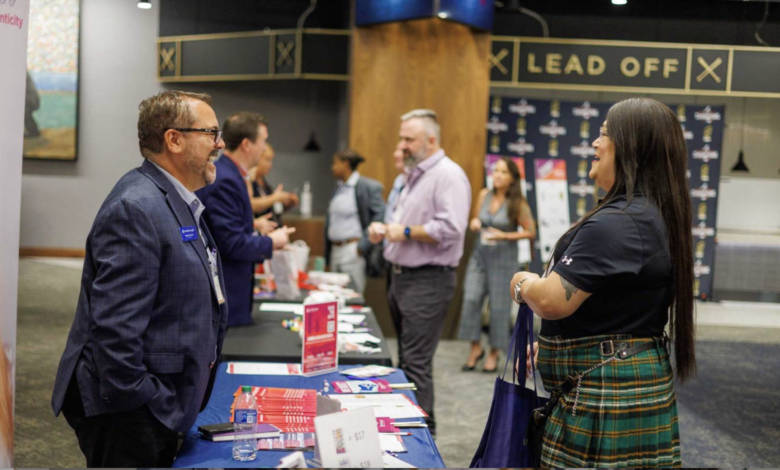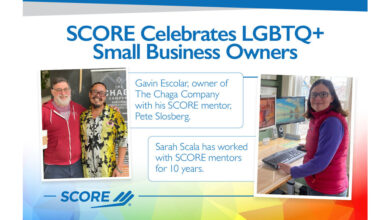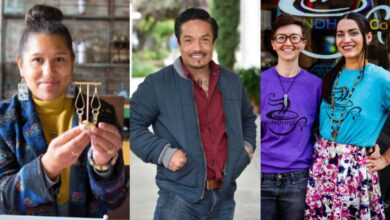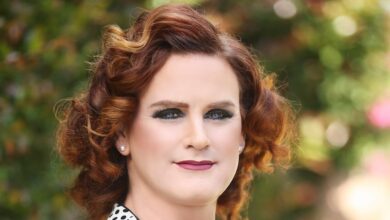Morris, Manning & Martin law firm conducts outreach at Atlanta LGBTQ business summit


The Buckhead law firm Morris, Manning & Martin is teaming up with OUT Georgia Business Alliance to present the Power of Connection, an LGBTQ+ business summit, from June 21-22 at the Federal Reserve Bank of Atlanta in Midtown.
The two-day summit includes networking, keynote speeches and sessions exploring the LGBTQ+ businesses, employees and organizations throughout Georgia.
It is also the first major event for Morris, Manning & Martin’s recently launched LGBTQ Business practice group that focuses on providing legal services to LGBTQ businesses and Fortune 500 companies.
“The goal of this new practice area is to ensure LGBTQ clients have ample opportunities to find the structural support and build the professional relationships necessary to thrive in the business world,” said practice co-chair Douglas D. Selph, who is gay and began the firm’s LGBTQ affinity group in 2014.

For five years, the firm has received a perfect score of 100 from the Human Rights Campaign Foundation’s Corporate Equality Index (CEI), an annual assessment of LGBTQ+ workplace equality.
“The firm’s experience and long-held commitment to equity and inclusion create an ideal platform to help LGBTQ businesses form strategic partnerships with other culturally aligned entities,” Selph said.
Chris Lugo, executive director of OUT Georgia Business Alliance, said Morris, Manning & Martin’s LGBTQ+ business practice is “a bold, innovative investment in the growing LGBTQ+ business community.”
“Aligning the firm’s values, expertise, and commitment to equity will drive significant impact for LGBTQ+ entrepreneurs, and we are honored to partner with the firm on these efforts,” Lugo said in a written statement.
Selph, 59, who is a real estate and finance partner and the former president of the Stonewall Bar Association of Georgia, co-leads the new group with commercial real estate associate Charles E. Hicks, 31, who is also gay.
Hicks organized attorneys with Morris, Manning & Martin to assist Atlanta Legal Aid Society’s pro-bono gender-affirming name-change project about two years ago. The program assists underprivileged, low-income people who are transgender or non-binary or gender expansive to change their legal gender and to change their names legally.
The overwhelming response by attorneys inspired Hicks to find more ways for Morris, Manning & Martin to help more people in his community.

As an ambassador for the OUT Georgia Business Alliance, Hicks meets many LGBTQ entrepreneurs and business owners. He learned they felt they could only go to small LGBTQ+ law firms to get their businesses started or for other small legal tasks. Atlanta’s large law firms were intimidating because there was no guarantee about how they felt about LGBTQ+ people.
“I’m all about lowering the barrier to entry for folks,” Hicks said. “We wanted to make it easy for folks to who were pursuing sophisticated business activities to identify a law firm that was friendly for them where they could come and join a network of other LGBTQ businesses or allied businesses, and also find a law firm that was giving back to their community.”
Law firms in Atlanta, especially the major law firms, are known as being LGBTQ-friendly and supportive, Hicks said.
“But we’re the only ones to do this type of practice group and trying to go out after specifically LGBTQ+ businesses,” he said.
Hicks pitched the successful LGBTQ+ business practice idea to Selph and others in the firm using data that shows there is a definite need for such services. They include:
• A 2022 Gallup Poll released says roughly 21% of Generation Z American adults (those born between 1997 and 2003) identify as LGBT — this means the market is growing.
• In March, the National Lesbian and Gay Chamber of Commerce certified its 2,000th gay business . The chamber also says small LGBTQ businesses contribute almost $2 trillion to the U.S. economy.
• The Consumer Financial Protection Bureau issued new guidelines on March 31 requiring the collection of LGBTQ identifying data to improve data collection on small business lending for LGBTQ-owned businesses. The reason is to ensure helps ensure the nation’s 1.4 million LGBTQ-owned businesses are “being treated fairly within the financial sector so that they can effectively compete, create opportunities, invest in employees, and uplift their communities.”
• A study released earlier this year by the LGBTQ Institute at the National Center for Civil and Human Rights and Emory’s Goizueta Business School says: “Respondents confidently exert economic power – 93.4% of respondents refused to purchase products from companies who are unsupportive of LGBTQ+ rights. Nearly 93% rewarded companies supportive of LGBTQ+ rights by purchasing their products.”
Studies also show LGBTQ+ businesses face numerous obstacles to achieving success, which means a robust legal business practice is needed, Hicks said, citing other studies.
• The Center for LGBTQ Economic Advancement & Research (CLEAR) reports LGBTQ-owned businesses are less likely to receive loans or financing than other businesses.
• Almost half of LGBTQ-owned businesses —46% — received none of the financing they applied for in 2021, compared to only 35% of non-LGBTQ businesses.
• LGBTQ businesses are more likely to report a wide range of challenges when working with large banks, including high interest rates and unfavorable repayment terms.
• Less than 1% of Fortune 1000 board seats are occupied by LGBTQ people.
Selph, who came out in his 40s, said he tried to develop business from LGBTQ+ acquaintances and people he would meet at various events. But he acknowledged he never thought creating an LGBTQ+ “cohesive practice group that would cover a lot of different disciplines and be something that the firm would actively market.”
“I think that’s a good comparison of kind of where I am as an older gay man,” he said. “And someone like Charles, who is young and embraces this … as a whole thing that we can actually use to develop business with.”
Part of what Martin, Morris & Manning is trying to do with its new business practice is provide a resource for LGBTQ people who don’t just want to start a business but to also scale that business and develop a successful exit strategy, Hicks said.
For example, Hicks said he recently was contacted by a lesbian via LinkedIn whose business for many years has been flipping residential homes. Now she wants to explore expanding into mixed-use projects, and is seeking an LGBTQ+-friendly law firm to assist her to secure real estate loans.
“As LGBTQ people, we’ve always had whisper networks of where we can go to get resources that we need,” Hicks said. “Part of the goal in creating this LGBTQ business practice group was to create a formal conduit for the community to access sophisticated legal services and to profit,” Hicks said.
Selph added that Morris, Manning & Martin has always had a philosophy of growing with clients and using their connections to put people together that need each other — for example putting investors in touch with real estate developers. But he’s noticed that LGBTQ businesses may not get that kind of help that is readily provided to, say, straight, white men.
“So we want to apply that same philosophy and help them to make the connections they need for their businesses and grow the businesses,” Selph said.





